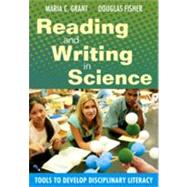
| Preface | |
| Acknowledgments | |
| About the Authors | |
| The Role of Language in Science | |
| Learning Is Based in Language | |
| Using Language in Science | |
| Developing and Activating Background Knowledge | |
| Why Background Knowledge Is Important | |
| Determining Relevant Background Knowledge | |
| Demonstrations: Understanding While Seeing | |
| Anticipation Guides: Looking for Misconceptions | |
| Bridging the Gap When Background Knowledge Is Scant | |
| ReQuest: Teaching Apprentices to Question | |
| DR-TA: Predicting as a Key to Scientific Reading | |
| QAR: Connecting Questions With Answers | |
| The Background Knowledge Big Picture | |
| Integrating Vocabulary Instruction Into the Science Classroom | |
| The Importance of Vocabulary | |
| Vocabulary Self-Awareness Charts | |
| Content Area Word Walls | |
| Instructional Routines Useful for Developing Vocabulary | |
| Semantic Feature Analysis: Assessing Relationships Between Words | |
| Word Cards: Investigating Examples and Non-Examples | |
| Semantic Mapping: Visualizing Word Relationships | |
| Fostering Independent Word Learning in Science | |
| Word Play Promotes Increased Vocabulary Knowledge | |
| Vocabulary Helps Students Understand Science | |
| Reading Science Texts | |
| Helping Students Read Science Texts | |
| Read-Alouds Support Student Learning | |
| Shared Reading Defined and Implemented | |
| The Benefits of Shared Reading | |
| Releasing Responsibility to Students | |
| Facilitating Collaborative Learning | |
| ReQuest: Reading With Questions | |
| Reciprocal Teaching: Practicing What Good Readers Do | |
| Incorporating Independent Practice | |
| Why Teach Reading in Science? | |
| Writing in Science: Scaffolding Skills for Science Students | |
| Writing Like a Scientist Is Different | |
| WebQuest: Collecting Data to Write | |
| Writing Frames: Scaffolding for Scientific Writing | |
| Teaching Scientific Phrasing | |
| Writing Formats in Science | |
| Why Learn to Write Like a Scientist? | |
| Assessing Student Learning in Science | |
| The Purpose of Assessment in Science | |
| Using Assessment Information | |
| Identifying Specific Students' Needs | |
| Creating Science Assessments | |
| Types of Assessments Useful in Science | |
| Final Thoughts About Assessment | |
| References | |
| Index | |
| Table of Contents provided by Ingram. All Rights Reserved. |
The New copy of this book will include any supplemental materials advertised. Please check the title of the book to determine if it should include any access cards, study guides, lab manuals, CDs, etc.
The Used, Rental and eBook copies of this book are not guaranteed to include any supplemental materials. Typically, only the book itself is included. This is true even if the title states it includes any access cards, study guides, lab manuals, CDs, etc.